Hospitality Industry: Growth, Roles, Skills Shortages in UK & Canada
VerifiedAdded on 2023/06/17
|9
|2749
|431
Report
AI Summary
This report provides a comprehensive overview of the hospitality industry, focusing on its various sectors, organizational structures (using Hilton Hotel as an example), and the interrelationships between different departments. It examines the direct and indirect impacts of the industry in the UK and Canada, analyzing global growth, licensing development, and franchising. The report also outlines a range of operational roles within the industry, the skills required for these roles, and the current skills shortage in the market, particularly in the UK. Factors driving this shortage and high labor turnover are explored, along with the impact of skills gaps on hospitality businesses. The report concludes with recommendations to address these skill gaps and improve the industry's workforce.
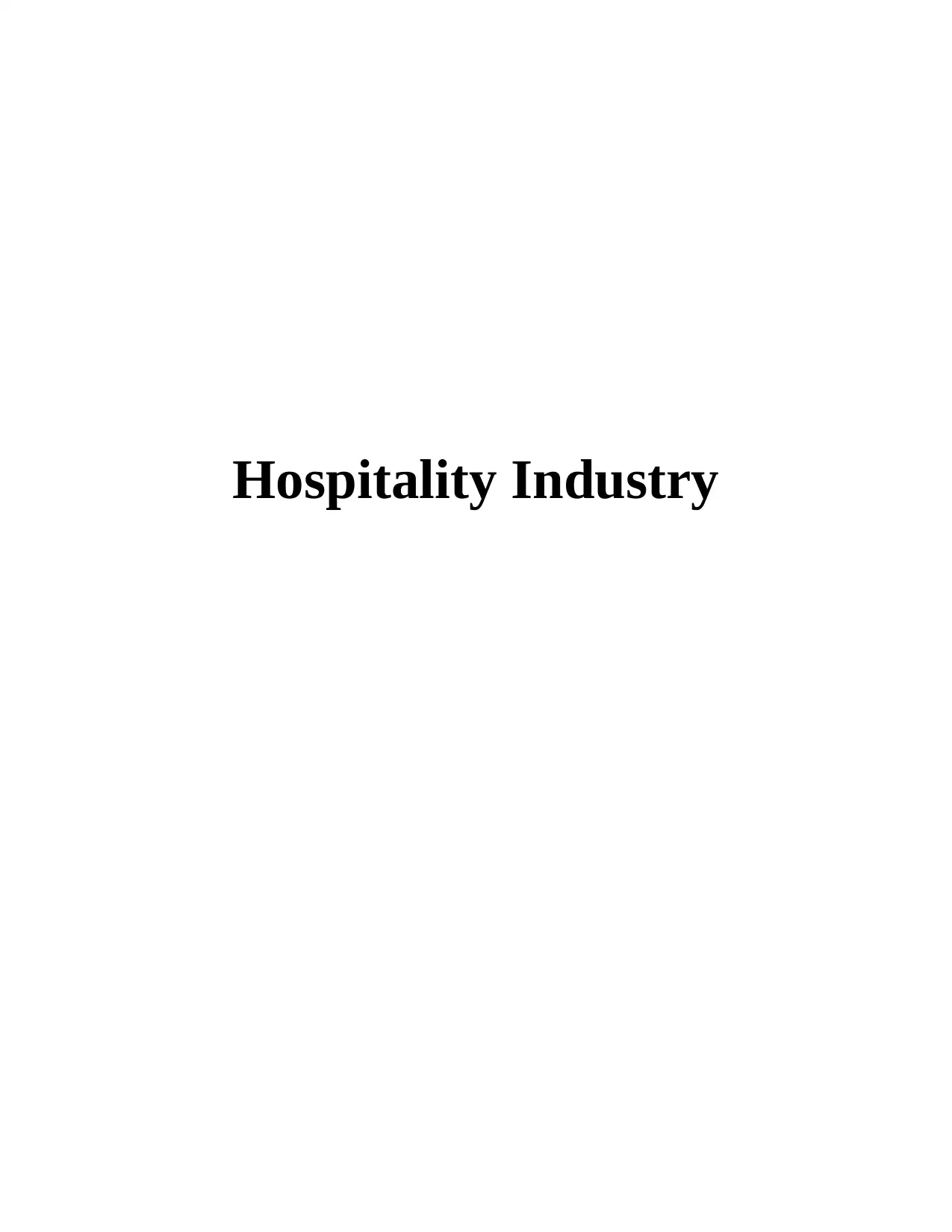
Hospitality Industry
Paraphrase This Document
Need a fresh take? Get an instant paraphrase of this document with our AI Paraphraser
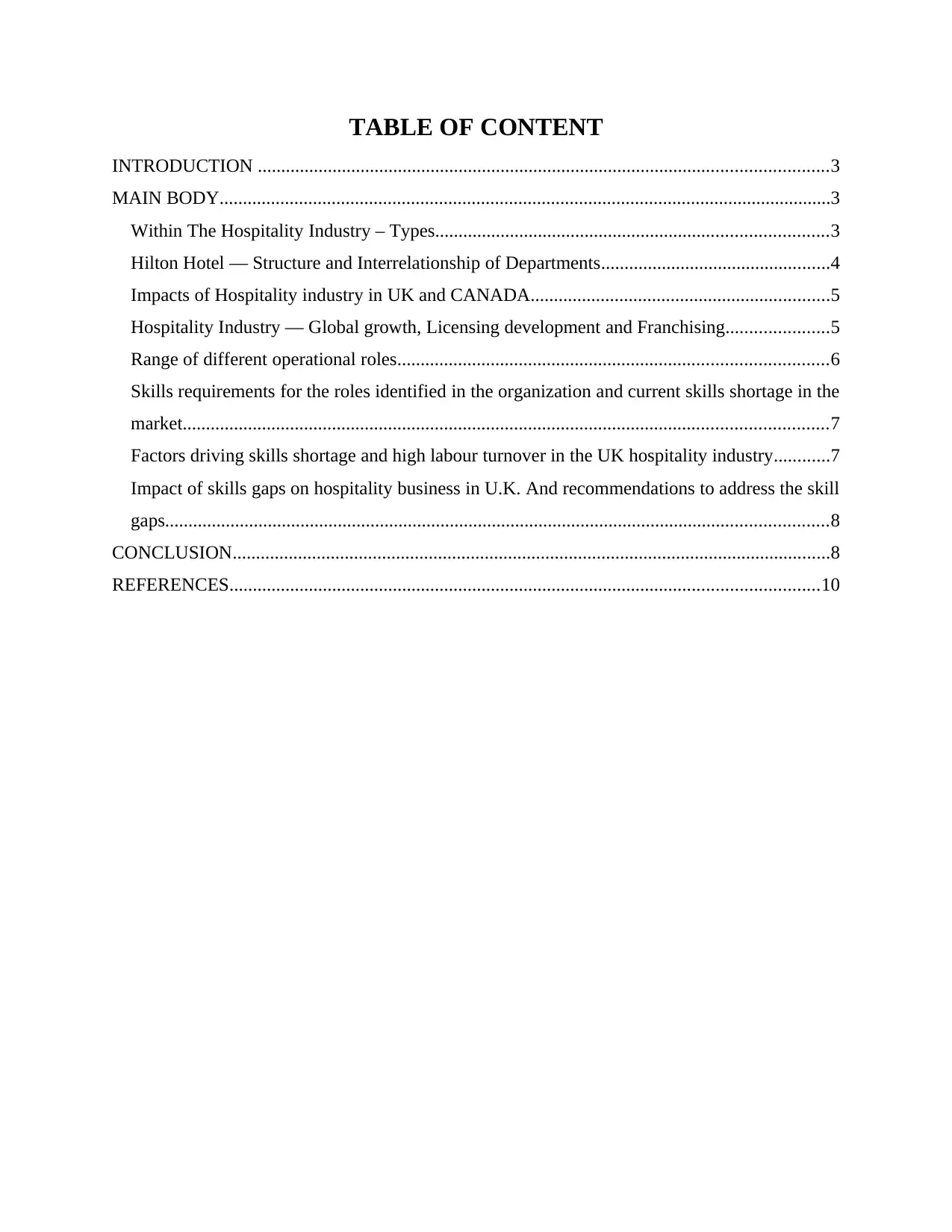
TABLE OF CONTENT
INTRODUCTION ..........................................................................................................................3
MAIN BODY...................................................................................................................................3
Within The Hospitality Industry – Types....................................................................................3
Hilton Hotel — Structure and Interrelationship of Departments.................................................4
Impacts of Hospitality industry in UK and CANADA................................................................5
Hospitality Industry — Global growth, Licensing development and Franchising......................5
Range of different operational roles............................................................................................6
Skills requirements for the roles identified in the organization and current skills shortage in the
market..........................................................................................................................................7
Factors driving skills shortage and high labour turnover in the UK hospitality industry............7
Impact of skills gaps on hospitality business in U.K. And recommendations to address the skill
gaps..............................................................................................................................................8
CONCLUSION................................................................................................................................8
REFERENCES..............................................................................................................................10
INTRODUCTION ..........................................................................................................................3
MAIN BODY...................................................................................................................................3
Within The Hospitality Industry – Types....................................................................................3
Hilton Hotel — Structure and Interrelationship of Departments.................................................4
Impacts of Hospitality industry in UK and CANADA................................................................5
Hospitality Industry — Global growth, Licensing development and Franchising......................5
Range of different operational roles............................................................................................6
Skills requirements for the roles identified in the organization and current skills shortage in the
market..........................................................................................................................................7
Factors driving skills shortage and high labour turnover in the UK hospitality industry............7
Impact of skills gaps on hospitality business in U.K. And recommendations to address the skill
gaps..............................................................................................................................................8
CONCLUSION................................................................................................................................8
REFERENCES..............................................................................................................................10
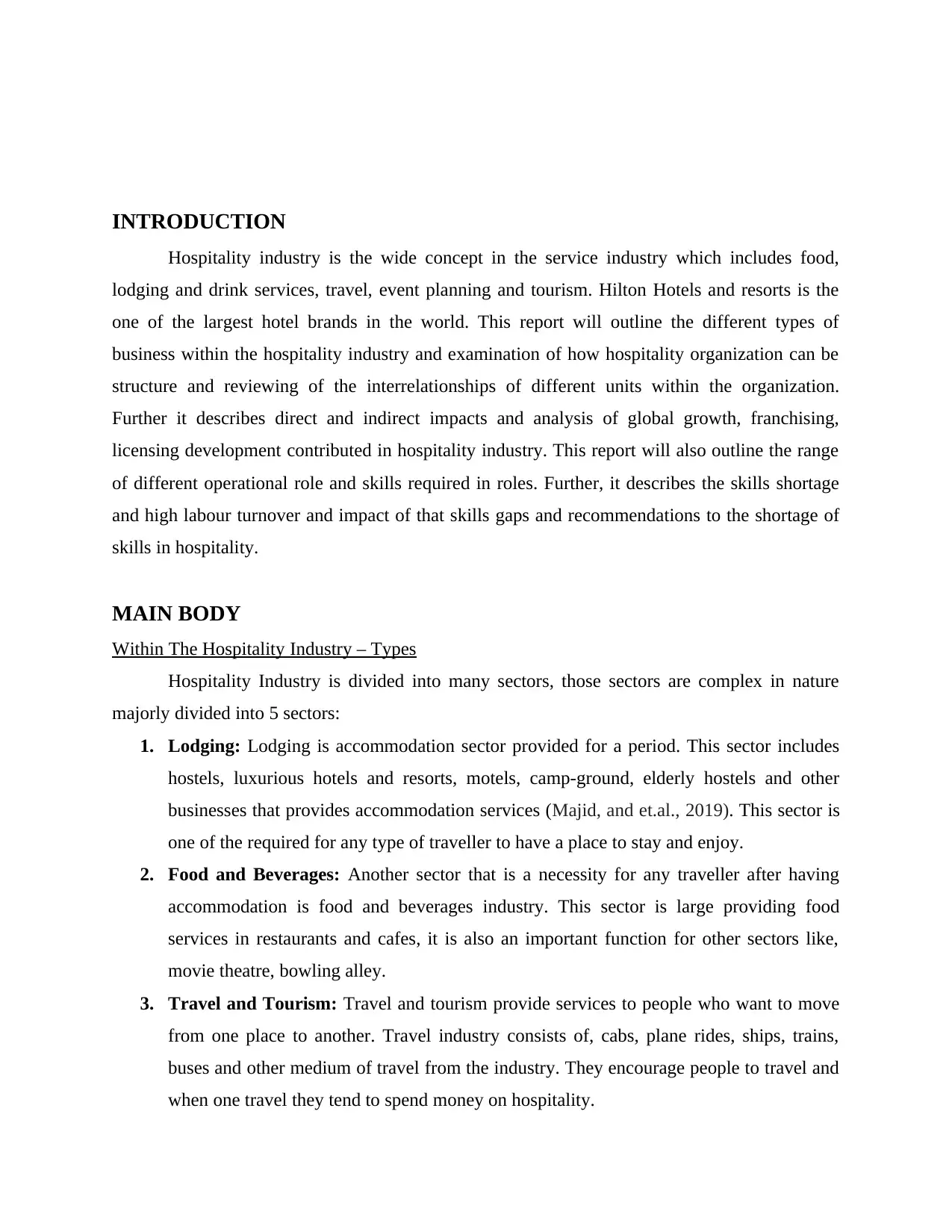
INTRODUCTION
Hospitality industry is the wide concept in the service industry which includes food,
lodging and drink services, travel, event planning and tourism. Hilton Hotels and resorts is the
one of the largest hotel brands in the world. This report will outline the different types of
business within the hospitality industry and examination of how hospitality organization can be
structure and reviewing of the interrelationships of different units within the organization.
Further it describes direct and indirect impacts and analysis of global growth, franchising,
licensing development contributed in hospitality industry. This report will also outline the range
of different operational role and skills required in roles. Further, it describes the skills shortage
and high labour turnover and impact of that skills gaps and recommendations to the shortage of
skills in hospitality.
MAIN BODY
Within The Hospitality Industry – Types
Hospitality Industry is divided into many sectors, those sectors are complex in nature
majorly divided into 5 sectors:
1. Lodging: Lodging is accommodation sector provided for a period. This sector includes
hostels, luxurious hotels and resorts, motels, camp-ground, elderly hostels and other
businesses that provides accommodation services (Majid, and et.al., 2019). This sector is
one of the required for any type of traveller to have a place to stay and enjoy.
2. Food and Beverages: Another sector that is a necessity for any traveller after having
accommodation is food and beverages industry. This sector is large providing food
services in restaurants and cafes, it is also an important function for other sectors like,
movie theatre, bowling alley.
3. Travel and Tourism: Travel and tourism provide services to people who want to move
from one place to another. Travel industry consists of, cabs, plane rides, ships, trains,
buses and other medium of travel from the industry. They encourage people to travel and
when one travel they tend to spend money on hospitality.
Hospitality industry is the wide concept in the service industry which includes food,
lodging and drink services, travel, event planning and tourism. Hilton Hotels and resorts is the
one of the largest hotel brands in the world. This report will outline the different types of
business within the hospitality industry and examination of how hospitality organization can be
structure and reviewing of the interrelationships of different units within the organization.
Further it describes direct and indirect impacts and analysis of global growth, franchising,
licensing development contributed in hospitality industry. This report will also outline the range
of different operational role and skills required in roles. Further, it describes the skills shortage
and high labour turnover and impact of that skills gaps and recommendations to the shortage of
skills in hospitality.
MAIN BODY
Within The Hospitality Industry – Types
Hospitality Industry is divided into many sectors, those sectors are complex in nature
majorly divided into 5 sectors:
1. Lodging: Lodging is accommodation sector provided for a period. This sector includes
hostels, luxurious hotels and resorts, motels, camp-ground, elderly hostels and other
businesses that provides accommodation services (Majid, and et.al., 2019). This sector is
one of the required for any type of traveller to have a place to stay and enjoy.
2. Food and Beverages: Another sector that is a necessity for any traveller after having
accommodation is food and beverages industry. This sector is large providing food
services in restaurants and cafes, it is also an important function for other sectors like,
movie theatre, bowling alley.
3. Travel and Tourism: Travel and tourism provide services to people who want to move
from one place to another. Travel industry consists of, cabs, plane rides, ships, trains,
buses and other medium of travel from the industry. They encourage people to travel and
when one travel they tend to spend money on hospitality.
⊘ This is a preview!⊘
Do you want full access?
Subscribe today to unlock all pages.

Trusted by 1+ million students worldwide
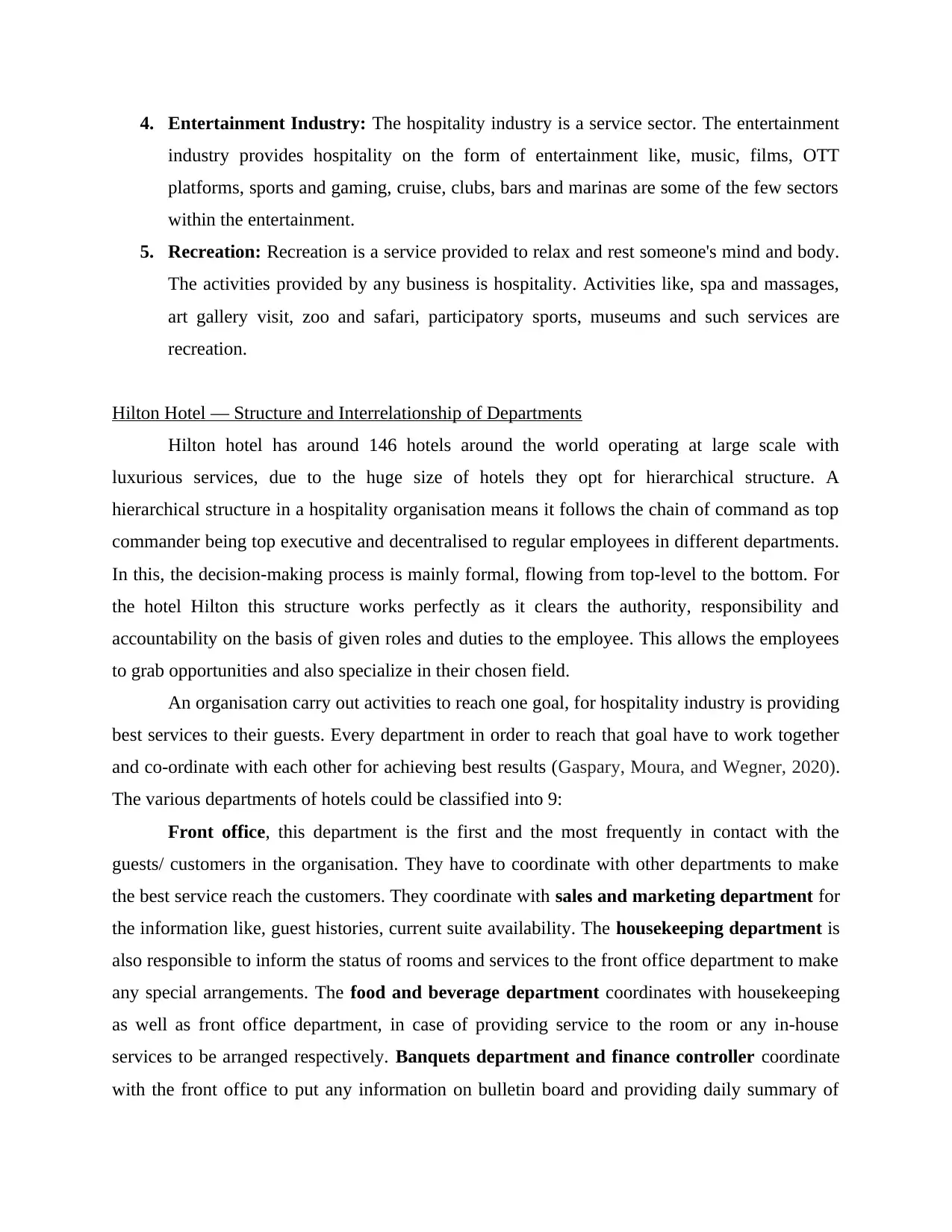
4. Entertainment Industry: The hospitality industry is a service sector. The entertainment
industry provides hospitality on the form of entertainment like, music, films, OTT
platforms, sports and gaming, cruise, clubs, bars and marinas are some of the few sectors
within the entertainment.
5. Recreation: Recreation is a service provided to relax and rest someone's mind and body.
The activities provided by any business is hospitality. Activities like, spa and massages,
art gallery visit, zoo and safari, participatory sports, museums and such services are
recreation.
Hilton Hotel — Structure and Interrelationship of Departments
Hilton hotel has around 146 hotels around the world operating at large scale with
luxurious services, due to the huge size of hotels they opt for hierarchical structure. A
hierarchical structure in a hospitality organisation means it follows the chain of command as top
commander being top executive and decentralised to regular employees in different departments.
In this, the decision-making process is mainly formal, flowing from top-level to the bottom. For
the hotel Hilton this structure works perfectly as it clears the authority, responsibility and
accountability on the basis of given roles and duties to the employee. This allows the employees
to grab opportunities and also specialize in their chosen field.
An organisation carry out activities to reach one goal, for hospitality industry is providing
best services to their guests. Every department in order to reach that goal have to work together
and co-ordinate with each other for achieving best results (Gaspary, Moura, and Wegner, 2020).
The various departments of hotels could be classified into 9:
Front office, this department is the first and the most frequently in contact with the
guests/ customers in the organisation. They have to coordinate with other departments to make
the best service reach the customers. They coordinate with sales and marketing department for
the information like, guest histories, current suite availability. The housekeeping department is
also responsible to inform the status of rooms and services to the front office department to make
any special arrangements. The food and beverage department coordinates with housekeeping
as well as front office department, in case of providing service to the room or any in-house
services to be arranged respectively. Banquets department and finance controller coordinate
with the front office to put any information on bulletin board and providing daily summary of
industry provides hospitality on the form of entertainment like, music, films, OTT
platforms, sports and gaming, cruise, clubs, bars and marinas are some of the few sectors
within the entertainment.
5. Recreation: Recreation is a service provided to relax and rest someone's mind and body.
The activities provided by any business is hospitality. Activities like, spa and massages,
art gallery visit, zoo and safari, participatory sports, museums and such services are
recreation.
Hilton Hotel — Structure and Interrelationship of Departments
Hilton hotel has around 146 hotels around the world operating at large scale with
luxurious services, due to the huge size of hotels they opt for hierarchical structure. A
hierarchical structure in a hospitality organisation means it follows the chain of command as top
commander being top executive and decentralised to regular employees in different departments.
In this, the decision-making process is mainly formal, flowing from top-level to the bottom. For
the hotel Hilton this structure works perfectly as it clears the authority, responsibility and
accountability on the basis of given roles and duties to the employee. This allows the employees
to grab opportunities and also specialize in their chosen field.
An organisation carry out activities to reach one goal, for hospitality industry is providing
best services to their guests. Every department in order to reach that goal have to work together
and co-ordinate with each other for achieving best results (Gaspary, Moura, and Wegner, 2020).
The various departments of hotels could be classified into 9:
Front office, this department is the first and the most frequently in contact with the
guests/ customers in the organisation. They have to coordinate with other departments to make
the best service reach the customers. They coordinate with sales and marketing department for
the information like, guest histories, current suite availability. The housekeeping department is
also responsible to inform the status of rooms and services to the front office department to make
any special arrangements. The food and beverage department coordinates with housekeeping
as well as front office department, in case of providing service to the room or any in-house
services to be arranged respectively. Banquets department and finance controller coordinate
with the front office to put any information on bulletin board and providing daily summary of
Paraphrase This Document
Need a fresh take? Get an instant paraphrase of this document with our AI Paraphraser
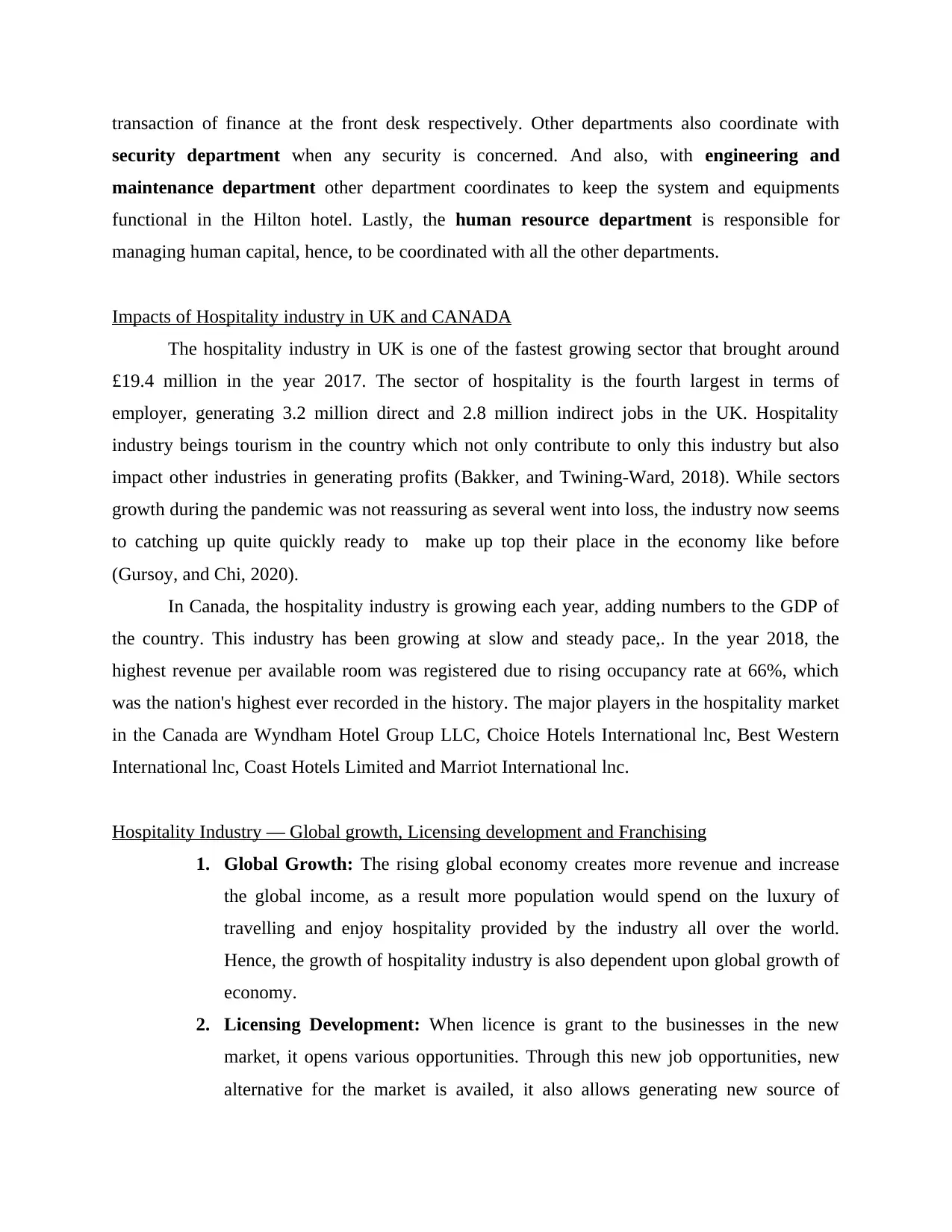
transaction of finance at the front desk respectively. Other departments also coordinate with
security department when any security is concerned. And also, with engineering and
maintenance department other department coordinates to keep the system and equipments
functional in the Hilton hotel. Lastly, the human resource department is responsible for
managing human capital, hence, to be coordinated with all the other departments.
Impacts of Hospitality industry in UK and CANADA
The hospitality industry in UK is one of the fastest growing sector that brought around
£19.4 million in the year 2017. The sector of hospitality is the fourth largest in terms of
employer, generating 3.2 million direct and 2.8 million indirect jobs in the UK. Hospitality
industry beings tourism in the country which not only contribute to only this industry but also
impact other industries in generating profits (Bakker, and Twining-Ward, 2018). While sectors
growth during the pandemic was not reassuring as several went into loss, the industry now seems
to catching up quite quickly ready to make up top their place in the economy like before
(Gursoy, and Chi, 2020).
In Canada, the hospitality industry is growing each year, adding numbers to the GDP of
the country. This industry has been growing at slow and steady pace,. In the year 2018, the
highest revenue per available room was registered due to rising occupancy rate at 66%, which
was the nation's highest ever recorded in the history. The major players in the hospitality market
in the Canada are Wyndham Hotel Group LLC, Choice Hotels International lnc, Best Western
International lnc, Coast Hotels Limited and Marriot International lnc.
Hospitality Industry — Global growth, Licensing development and Franchising
1. Global Growth: The rising global economy creates more revenue and increase
the global income, as a result more population would spend on the luxury of
travelling and enjoy hospitality provided by the industry all over the world.
Hence, the growth of hospitality industry is also dependent upon global growth of
economy.
2. Licensing Development: When licence is grant to the businesses in the new
market, it opens various opportunities. Through this new job opportunities, new
alternative for the market is availed, it also allows generating new source of
security department when any security is concerned. And also, with engineering and
maintenance department other department coordinates to keep the system and equipments
functional in the Hilton hotel. Lastly, the human resource department is responsible for
managing human capital, hence, to be coordinated with all the other departments.
Impacts of Hospitality industry in UK and CANADA
The hospitality industry in UK is one of the fastest growing sector that brought around
£19.4 million in the year 2017. The sector of hospitality is the fourth largest in terms of
employer, generating 3.2 million direct and 2.8 million indirect jobs in the UK. Hospitality
industry beings tourism in the country which not only contribute to only this industry but also
impact other industries in generating profits (Bakker, and Twining-Ward, 2018). While sectors
growth during the pandemic was not reassuring as several went into loss, the industry now seems
to catching up quite quickly ready to make up top their place in the economy like before
(Gursoy, and Chi, 2020).
In Canada, the hospitality industry is growing each year, adding numbers to the GDP of
the country. This industry has been growing at slow and steady pace,. In the year 2018, the
highest revenue per available room was registered due to rising occupancy rate at 66%, which
was the nation's highest ever recorded in the history. The major players in the hospitality market
in the Canada are Wyndham Hotel Group LLC, Choice Hotels International lnc, Best Western
International lnc, Coast Hotels Limited and Marriot International lnc.
Hospitality Industry — Global growth, Licensing development and Franchising
1. Global Growth: The rising global economy creates more revenue and increase
the global income, as a result more population would spend on the luxury of
travelling and enjoy hospitality provided by the industry all over the world.
Hence, the growth of hospitality industry is also dependent upon global growth of
economy.
2. Licensing Development: When licence is grant to the businesses in the new
market, it opens various opportunities. Through this new job opportunities, new
alternative for the market is availed, it also allows generating new source of
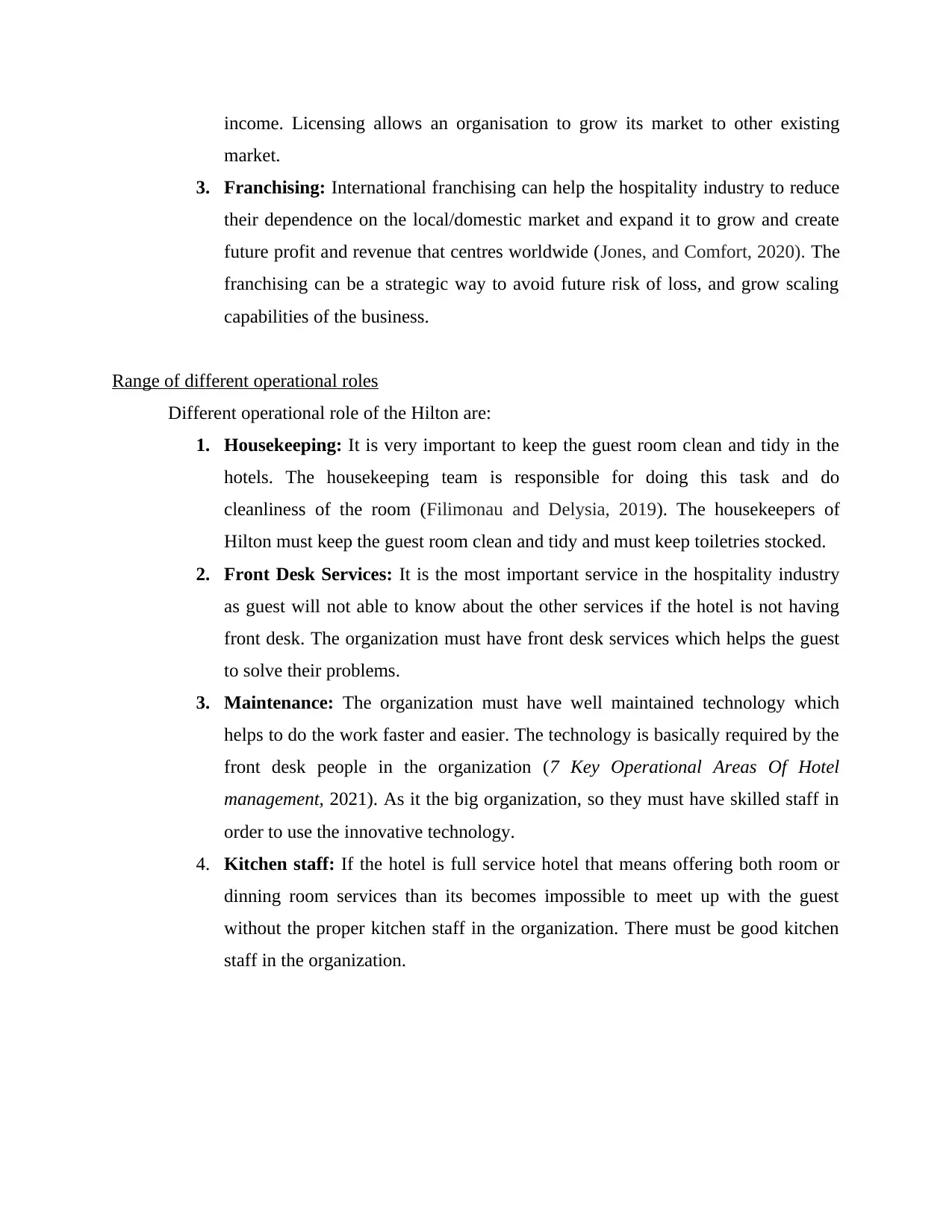
income. Licensing allows an organisation to grow its market to other existing
market.
3. Franchising: International franchising can help the hospitality industry to reduce
their dependence on the local/domestic market and expand it to grow and create
future profit and revenue that centres worldwide (Jones, and Comfort, 2020). The
franchising can be a strategic way to avoid future risk of loss, and grow scaling
capabilities of the business.
Range of different operational roles
Different operational role of the Hilton are:
1. Housekeeping: It is very important to keep the guest room clean and tidy in the
hotels. The housekeeping team is responsible for doing this task and do
cleanliness of the room (Filimonau and Delysia, 2019). The housekeepers of
Hilton must keep the guest room clean and tidy and must keep toiletries stocked.
2. Front Desk Services: It is the most important service in the hospitality industry
as guest will not able to know about the other services if the hotel is not having
front desk. The organization must have front desk services which helps the guest
to solve their problems.
3. Maintenance: The organization must have well maintained technology which
helps to do the work faster and easier. The technology is basically required by the
front desk people in the organization (7 Key Operational Areas Of Hotel
management, 2021). As it the big organization, so they must have skilled staff in
order to use the innovative technology.
4. Kitchen staff: If the hotel is full service hotel that means offering both room or
dinning room services than its becomes impossible to meet up with the guest
without the proper kitchen staff in the organization. There must be good kitchen
staff in the organization.
market.
3. Franchising: International franchising can help the hospitality industry to reduce
their dependence on the local/domestic market and expand it to grow and create
future profit and revenue that centres worldwide (Jones, and Comfort, 2020). The
franchising can be a strategic way to avoid future risk of loss, and grow scaling
capabilities of the business.
Range of different operational roles
Different operational role of the Hilton are:
1. Housekeeping: It is very important to keep the guest room clean and tidy in the
hotels. The housekeeping team is responsible for doing this task and do
cleanliness of the room (Filimonau and Delysia, 2019). The housekeepers of
Hilton must keep the guest room clean and tidy and must keep toiletries stocked.
2. Front Desk Services: It is the most important service in the hospitality industry
as guest will not able to know about the other services if the hotel is not having
front desk. The organization must have front desk services which helps the guest
to solve their problems.
3. Maintenance: The organization must have well maintained technology which
helps to do the work faster and easier. The technology is basically required by the
front desk people in the organization (7 Key Operational Areas Of Hotel
management, 2021). As it the big organization, so they must have skilled staff in
order to use the innovative technology.
4. Kitchen staff: If the hotel is full service hotel that means offering both room or
dinning room services than its becomes impossible to meet up with the guest
without the proper kitchen staff in the organization. There must be good kitchen
staff in the organization.
⊘ This is a preview!⊘
Do you want full access?
Subscribe today to unlock all pages.

Trusted by 1+ million students worldwide
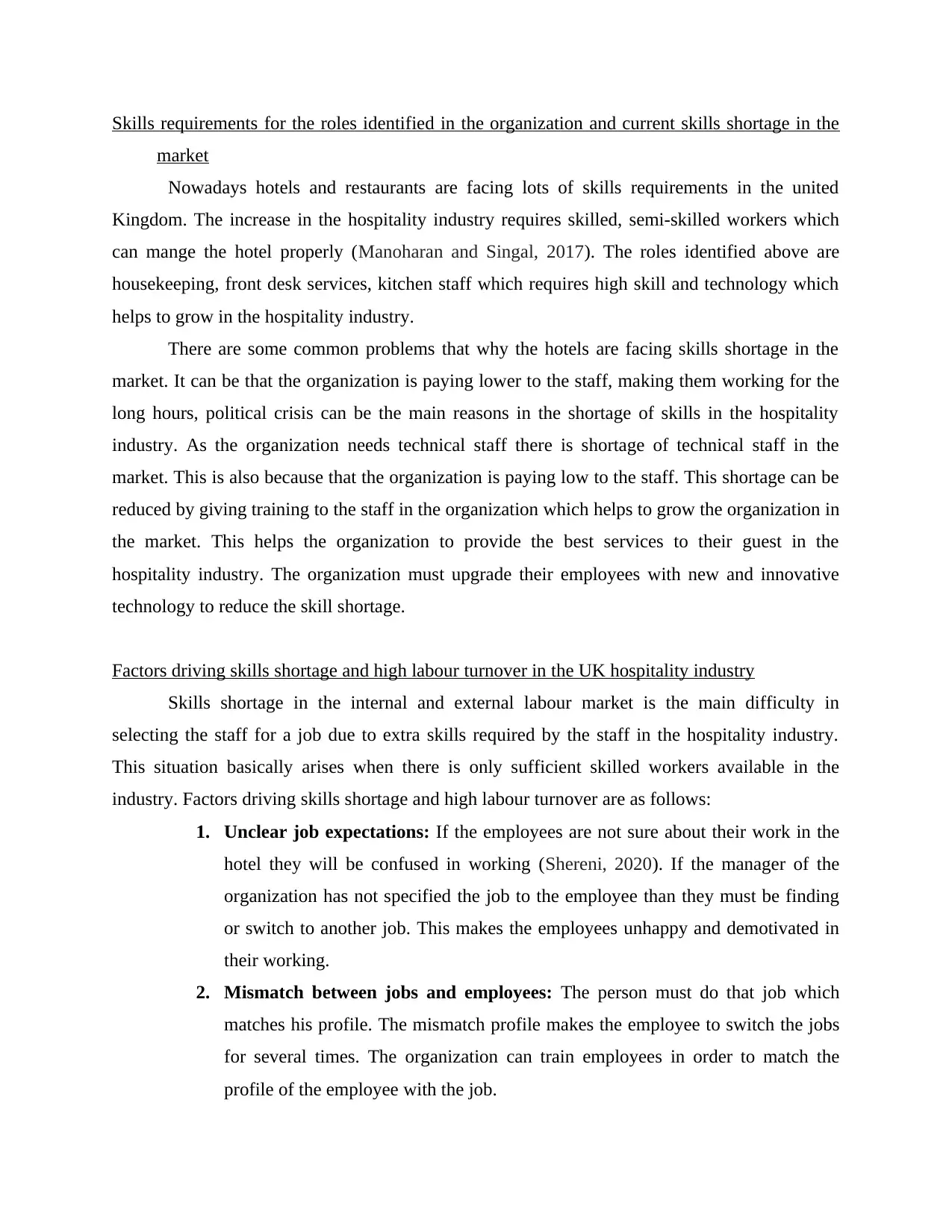
Skills requirements for the roles identified in the organization and current skills shortage in the
market
Nowadays hotels and restaurants are facing lots of skills requirements in the united
Kingdom. The increase in the hospitality industry requires skilled, semi-skilled workers which
can mange the hotel properly (Manoharan and Singal, 2017). The roles identified above are
housekeeping, front desk services, kitchen staff which requires high skill and technology which
helps to grow in the hospitality industry.
There are some common problems that why the hotels are facing skills shortage in the
market. It can be that the organization is paying lower to the staff, making them working for the
long hours, political crisis can be the main reasons in the shortage of skills in the hospitality
industry. As the organization needs technical staff there is shortage of technical staff in the
market. This is also because that the organization is paying low to the staff. This shortage can be
reduced by giving training to the staff in the organization which helps to grow the organization in
the market. This helps the organization to provide the best services to their guest in the
hospitality industry. The organization must upgrade their employees with new and innovative
technology to reduce the skill shortage.
Factors driving skills shortage and high labour turnover in the UK hospitality industry
Skills shortage in the internal and external labour market is the main difficulty in
selecting the staff for a job due to extra skills required by the staff in the hospitality industry.
This situation basically arises when there is only sufficient skilled workers available in the
industry. Factors driving skills shortage and high labour turnover are as follows:
1. Unclear job expectations: If the employees are not sure about their work in the
hotel they will be confused in working (Shereni, 2020). If the manager of the
organization has not specified the job to the employee than they must be finding
or switch to another job. This makes the employees unhappy and demotivated in
their working.
2. Mismatch between jobs and employees: The person must do that job which
matches his profile. The mismatch profile makes the employee to switch the jobs
for several times. The organization can train employees in order to match the
profile of the employee with the job.
market
Nowadays hotels and restaurants are facing lots of skills requirements in the united
Kingdom. The increase in the hospitality industry requires skilled, semi-skilled workers which
can mange the hotel properly (Manoharan and Singal, 2017). The roles identified above are
housekeeping, front desk services, kitchen staff which requires high skill and technology which
helps to grow in the hospitality industry.
There are some common problems that why the hotels are facing skills shortage in the
market. It can be that the organization is paying lower to the staff, making them working for the
long hours, political crisis can be the main reasons in the shortage of skills in the hospitality
industry. As the organization needs technical staff there is shortage of technical staff in the
market. This is also because that the organization is paying low to the staff. This shortage can be
reduced by giving training to the staff in the organization which helps to grow the organization in
the market. This helps the organization to provide the best services to their guest in the
hospitality industry. The organization must upgrade their employees with new and innovative
technology to reduce the skill shortage.
Factors driving skills shortage and high labour turnover in the UK hospitality industry
Skills shortage in the internal and external labour market is the main difficulty in
selecting the staff for a job due to extra skills required by the staff in the hospitality industry.
This situation basically arises when there is only sufficient skilled workers available in the
industry. Factors driving skills shortage and high labour turnover are as follows:
1. Unclear job expectations: If the employees are not sure about their work in the
hotel they will be confused in working (Shereni, 2020). If the manager of the
organization has not specified the job to the employee than they must be finding
or switch to another job. This makes the employees unhappy and demotivated in
their working.
2. Mismatch between jobs and employees: The person must do that job which
matches his profile. The mismatch profile makes the employee to switch the jobs
for several times. The organization can train employees in order to match the
profile of the employee with the job.
Paraphrase This Document
Need a fresh take? Get an instant paraphrase of this document with our AI Paraphraser
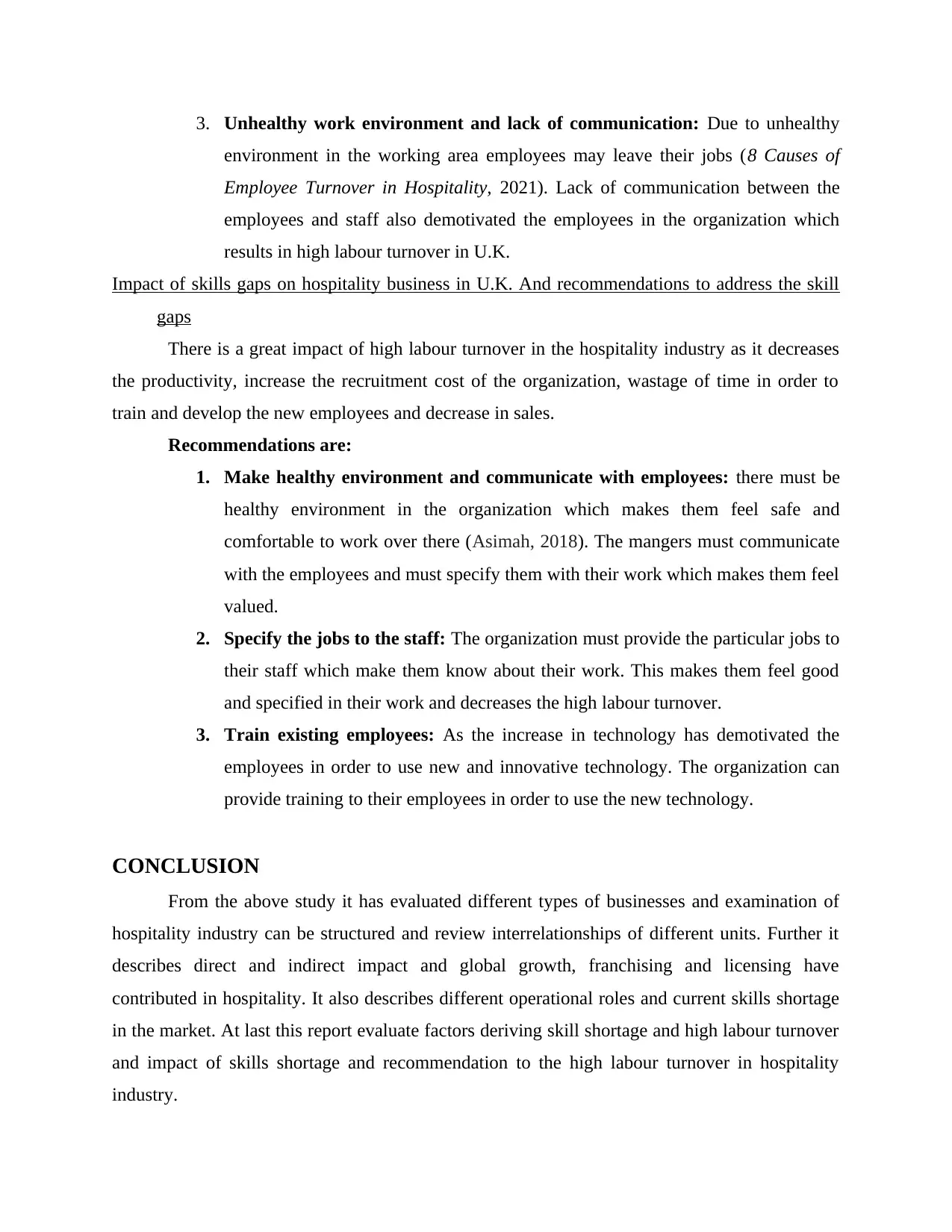
3. Unhealthy work environment and lack of communication: Due to unhealthy
environment in the working area employees may leave their jobs (8 Causes of
Employee Turnover in Hospitality, 2021). Lack of communication between the
employees and staff also demotivated the employees in the organization which
results in high labour turnover in U.K.
Impact of skills gaps on hospitality business in U.K. And recommendations to address the skill
gaps
There is a great impact of high labour turnover in the hospitality industry as it decreases
the productivity, increase the recruitment cost of the organization, wastage of time in order to
train and develop the new employees and decrease in sales.
Recommendations are:
1. Make healthy environment and communicate with employees: there must be
healthy environment in the organization which makes them feel safe and
comfortable to work over there (Asimah, 2018). The mangers must communicate
with the employees and must specify them with their work which makes them feel
valued.
2. Specify the jobs to the staff: The organization must provide the particular jobs to
their staff which make them know about their work. This makes them feel good
and specified in their work and decreases the high labour turnover.
3. Train existing employees: As the increase in technology has demotivated the
employees in order to use new and innovative technology. The organization can
provide training to their employees in order to use the new technology.
CONCLUSION
From the above study it has evaluated different types of businesses and examination of
hospitality industry can be structured and review interrelationships of different units. Further it
describes direct and indirect impact and global growth, franchising and licensing have
contributed in hospitality. It also describes different operational roles and current skills shortage
in the market. At last this report evaluate factors deriving skill shortage and high labour turnover
and impact of skills shortage and recommendation to the high labour turnover in hospitality
industry.
environment in the working area employees may leave their jobs (8 Causes of
Employee Turnover in Hospitality, 2021). Lack of communication between the
employees and staff also demotivated the employees in the organization which
results in high labour turnover in U.K.
Impact of skills gaps on hospitality business in U.K. And recommendations to address the skill
gaps
There is a great impact of high labour turnover in the hospitality industry as it decreases
the productivity, increase the recruitment cost of the organization, wastage of time in order to
train and develop the new employees and decrease in sales.
Recommendations are:
1. Make healthy environment and communicate with employees: there must be
healthy environment in the organization which makes them feel safe and
comfortable to work over there (Asimah, 2018). The mangers must communicate
with the employees and must specify them with their work which makes them feel
valued.
2. Specify the jobs to the staff: The organization must provide the particular jobs to
their staff which make them know about their work. This makes them feel good
and specified in their work and decreases the high labour turnover.
3. Train existing employees: As the increase in technology has demotivated the
employees in order to use new and innovative technology. The organization can
provide training to their employees in order to use the new technology.
CONCLUSION
From the above study it has evaluated different types of businesses and examination of
hospitality industry can be structured and review interrelationships of different units. Further it
describes direct and indirect impact and global growth, franchising and licensing have
contributed in hospitality. It also describes different operational roles and current skills shortage
in the market. At last this report evaluate factors deriving skill shortage and high labour turnover
and impact of skills shortage and recommendation to the high labour turnover in hospitality
industry.
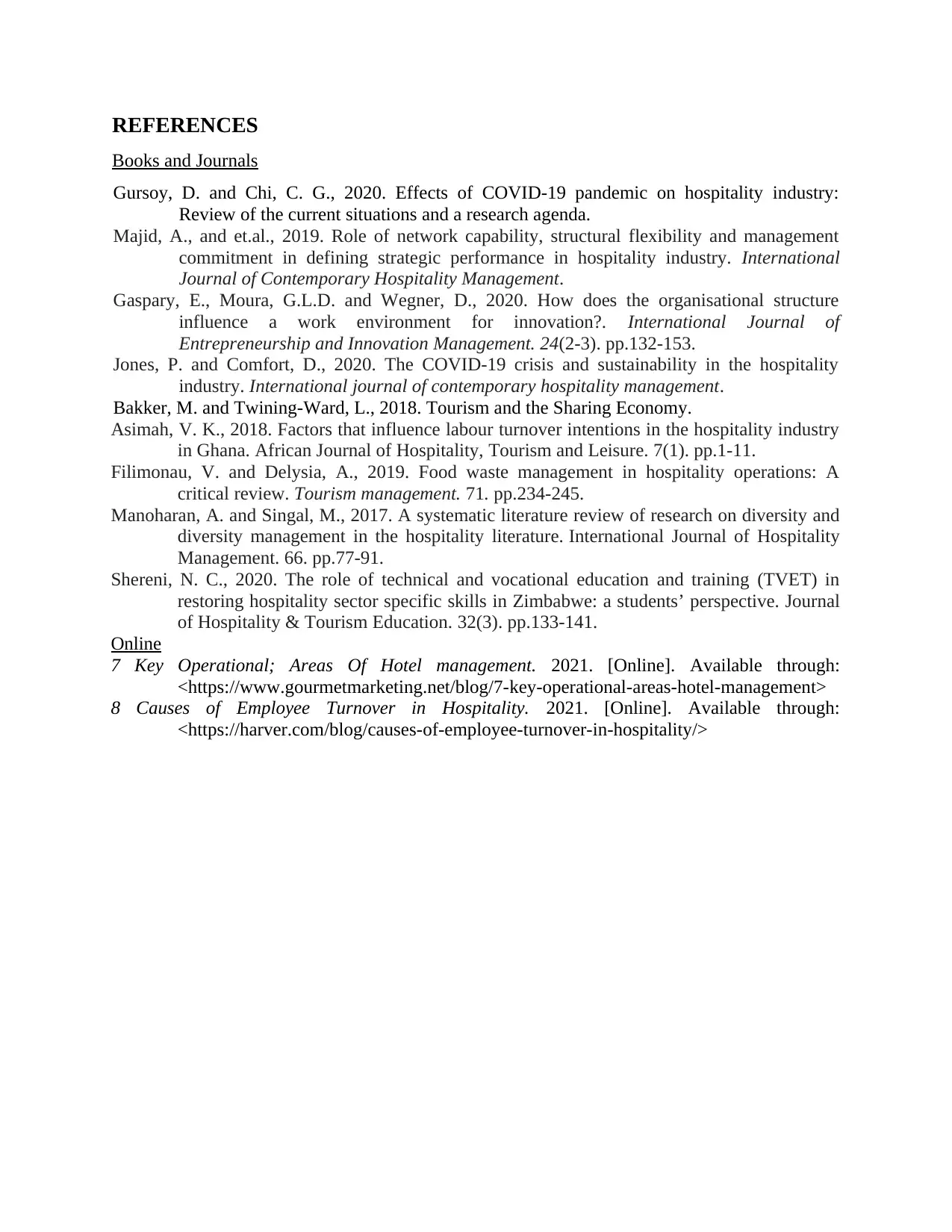
REFERENCES
Books and Journals
Gursoy, D. and Chi, C. G., 2020. Effects of COVID-19 pandemic on hospitality industry:
Review of the current situations and a research agenda.
Majid, A., and et.al., 2019. Role of network capability, structural flexibility and management
commitment in defining strategic performance in hospitality industry. International
Journal of Contemporary Hospitality Management.
Gaspary, E., Moura, G.L.D. and Wegner, D., 2020. How does the organisational structure
influence a work environment for innovation?. International Journal of
Entrepreneurship and Innovation Management. 24(2-3). pp.132-153.
Jones, P. and Comfort, D., 2020. The COVID-19 crisis and sustainability in the hospitality
industry. International journal of contemporary hospitality management.
Bakker, M. and Twining-Ward, L., 2018. Tourism and the Sharing Economy.
Asimah, V. K., 2018. Factors that influence labour turnover intentions in the hospitality industry
in Ghana. African Journal of Hospitality, Tourism and Leisure. 7(1). pp.1-11.
Filimonau, V. and Delysia, A., 2019. Food waste management in hospitality operations: A
critical review. Tourism management. 71. pp.234-245.
Manoharan, A. and Singal, M., 2017. A systematic literature review of research on diversity and
diversity management in the hospitality literature. International Journal of Hospitality
Management. 66. pp.77-91.
Shereni, N. C., 2020. The role of technical and vocational education and training (TVET) in
restoring hospitality sector specific skills in Zimbabwe: a students’ perspective. Journal
of Hospitality & Tourism Education. 32(3). pp.133-141.
Online
7 Key Operational; Areas Of Hotel management. 2021. [Online]. Available through:
<https://www.gourmetmarketing.net/blog/7-key-operational-areas-hotel-management>
8 Causes of Employee Turnover in Hospitality. 2021. [Online]. Available through:
<https://harver.com/blog/causes-of-employee-turnover-in-hospitality/>
Books and Journals
Gursoy, D. and Chi, C. G., 2020. Effects of COVID-19 pandemic on hospitality industry:
Review of the current situations and a research agenda.
Majid, A., and et.al., 2019. Role of network capability, structural flexibility and management
commitment in defining strategic performance in hospitality industry. International
Journal of Contemporary Hospitality Management.
Gaspary, E., Moura, G.L.D. and Wegner, D., 2020. How does the organisational structure
influence a work environment for innovation?. International Journal of
Entrepreneurship and Innovation Management. 24(2-3). pp.132-153.
Jones, P. and Comfort, D., 2020. The COVID-19 crisis and sustainability in the hospitality
industry. International journal of contemporary hospitality management.
Bakker, M. and Twining-Ward, L., 2018. Tourism and the Sharing Economy.
Asimah, V. K., 2018. Factors that influence labour turnover intentions in the hospitality industry
in Ghana. African Journal of Hospitality, Tourism and Leisure. 7(1). pp.1-11.
Filimonau, V. and Delysia, A., 2019. Food waste management in hospitality operations: A
critical review. Tourism management. 71. pp.234-245.
Manoharan, A. and Singal, M., 2017. A systematic literature review of research on diversity and
diversity management in the hospitality literature. International Journal of Hospitality
Management. 66. pp.77-91.
Shereni, N. C., 2020. The role of technical and vocational education and training (TVET) in
restoring hospitality sector specific skills in Zimbabwe: a students’ perspective. Journal
of Hospitality & Tourism Education. 32(3). pp.133-141.
Online
7 Key Operational; Areas Of Hotel management. 2021. [Online]. Available through:
<https://www.gourmetmarketing.net/blog/7-key-operational-areas-hotel-management>
8 Causes of Employee Turnover in Hospitality. 2021. [Online]. Available through:
<https://harver.com/blog/causes-of-employee-turnover-in-hospitality/>
⊘ This is a preview!⊘
Do you want full access?
Subscribe today to unlock all pages.

Trusted by 1+ million students worldwide
1 out of 9
Related Documents
Your All-in-One AI-Powered Toolkit for Academic Success.
+13062052269
info@desklib.com
Available 24*7 on WhatsApp / Email
![[object Object]](/_next/static/media/star-bottom.7253800d.svg)
Unlock your academic potential
Copyright © 2020–2026 A2Z Services. All Rights Reserved. Developed and managed by ZUCOL.


